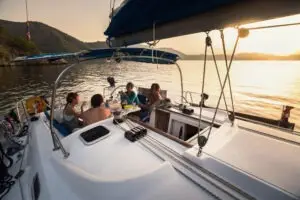
Viles & Beckman understands the complexities of maritime laws and will protect victims’ rights. If you were injured by someone’s negligence, our Fort Myers boating accident lawyers will build a strong case to recover maximum compensation on your behalf. Call us today to discuss the details of your case.
Historical Development of Maritime Law
The historical development of maritime law dates back to ancient times. From the earliest civilizations, such as the ancient Greeks and Romans, maritime law has played a crucial role in regulating trade and resolving disputes at sea.
The medieval era witnessed the emergence of maritime courts and the establishment of maritime principles. As global trade expanded during the Age of Exploration, the need for comprehensive maritime regulations grew. This led to the development of international maritime conventions, like the 17th century Rôles d’Oléron and the 19th century London Conventions.
Over the centuries, various maritime codes and customs have emerged, shaping the foundation of modern maritime law. Today, maritime law continues to evolve as new challenges arise in the ever-changing world of foreign commerce.


Expect More, Receive More: Legal Support That Feels Like Family
Jurisdiction and Applicable Laws in Maritime Disputes
Conflicts arising from activities on navigable waters are resolved through applicable laws based on jurisdiction. Determining the appropriate jurisdiction involves establishing which court or legal system has the authority to hear the case.
The following factors determine the appropriate maritime jurisdiction:
- Location of the incident
- Territorial waters
- Nationality of the involved parties
- Contractual agreements
- Type of dispute
- Maritime matters
- Type of the vessel involved
International Legal Frameworks for Maritime Law
These frameworks provide a set of rules and regulations that aim to ensure the smooth functioning of maritime activities across the globe.
Here are key aspects of the international legal frameworks in maritime law:
- United Nations Convention on the Law of the Sea (UNCLOS): This treaty establishes the legal framework for the use and conservation of the world’s oceans. The UNCLOS defines the rights and responsibilities of nations concerning maritime boundaries, resources, and navigation.
- International Maritime Organization (IMO): This agency of the United Nations is responsible for regulating shipping. They develop and maintain the international legal framework for maritime safety, security, and environmental protection.
- International maritime conventions: These include various international agreements, such as the International Convention for the Prevention of Pollution from Ships (MARPOL) and the International Convention for the Safety of Life at Sea (SOLAS), that regulate specific aspects of maritime activities.
- Customary international law: These are legal principles and norms developed through consistent and widespread state practice in the maritime domain, such as the duty to assist ships in distress.
Understanding these international legal frameworks is crucial for anyone interested in maritime law as they help resolve disputes, ensure safety, and promote cooperation in the maritime industry.
Rights and Responsibilities of Shipowners and Operators
In the intricate web of maritime operations, shipowners and operators play crucial roles. They have a unique blend of rights and responsibilities that govern the safe and efficient functioning of the maritime industry.
Shipowners and operators must ensure compliance with international regulations, safeguard crew and cargo, and mitigate potential environmental risks.
Shipowner Liability Limits
Shipowner liability limits set the boundaries on a shipowner’s financial responsibility in boating accidents or losses involving their vessel. These limits are designed to strike a balance between protecting shipowners from excessive financial burdens and ensuring sufficient compensation for those affected by accidents.
The most notable regime for shipowner liability limits is the International Convention on Limitation of Liability for Maritime Claims (LLMC). Under this framework, shipowners can limit their liability to a predefined amount, typically calculated based on the vessel’s cargo.
This limitation covers a wide array of scenarios, including:
- Cargo damage
- Personal injury
- Environmental pollution
- Collision
However, shipowners may lose the right to limit liability if the incident results from their intentional or reckless behavior. If you were injured in a maritime accident, a Fort Myers personal injury lawyer will investigate the circumstances surrounding the incident and prove liability.
Operator Duty of Care
Operators are entrusted with ensuring that everyone on board is safe. This involves implementing safety protocols, conducting regular maintenance checks, and properly training the crew. They must also stay updated on the latest regulations and industry standards to ensure compliance and mitigate potential risks.
In case of emergencies or accidents, vessel operators are responsible for taking immediate action to safeguard the lives of those onboard and coordinating with relevant authorities for assistance.
Crew Safety Regulations
Crew safety regulations help prevent injuries for those aboard a vessel. These regulations encompass a wide spectrum of guidelines and protocols designed to mitigate potential hazards and maintain a secure environment on international waters.
Here are key aspects of crew safety regulations that should be prioritized:
- Personal protective equipment (PPE): All crew members should have the necessary PPE, such as life jackets, helmets, and safety harnesses, to protect them in emergencies.
- Safety training: All crew members should receive comprehensive safety training, including emergency response procedures, fire safety, and first aid, to ensure they are well-prepared to handle any situation that may arise.
- Regular safety inspections: Boat operators should conduct regular inspections of the vessel to identify and address potential safety hazards, ensuring a safe working environment for everyone onboard.
- Communication and reporting: Boat owners and operators should encourage open communication and reporting safety concerns or incidents, allowing us to take prompt action and prevent future accidents.
Current Challenges and Future Trends in Maritime Law
One of the current challenges in maritime law is the need to adapt to emerging technologies and their impact on the industry. As advancements reshape the maritime landscape, we must navigate these changes to ensure the law remains relevant and effective.
Current challenges in maritime laws include:
- Cybersecurity: With increased reliance on digital systems, protecting against cyber threats is crucial to prevent data breaches and potential disruptions to maritime operations.
- Autonomous vessels: The rise of unmanned ships presents unique legal questions regarding liability, marine insurance, and compliance with international regulations.
- Environmental sustainability: As the world focuses on reducing carbon emissions, maritime law must address the industry’s environmental impact and enforce stricter regulations to promote sustainability.
- E-commerce and digital transactions: The growing popularity of online platforms for maritime trade requires updated legal frameworks to address issues like contract formation, dispute resolution, and security of transactions.
Meeting these challenges will require collaboration between maritime lawyers, industry stakeholders, and technology innovators to ensure maritime law remains adaptable and effective in the face of rapid technological advancements.
Our Legal Team Will Help With Your Case
Maritime law plays a crucial role in regulating and governing activities on navigable waters. It ensures the smooth functioning of maritime trade and transportation through its historical development and key principles.
At Viles & Beckman, we will help you navigate maritime laws. If you were involved in an accident, we will help you better understand how maritime laws apply to your case. Contact us today for a free legal consultation.



